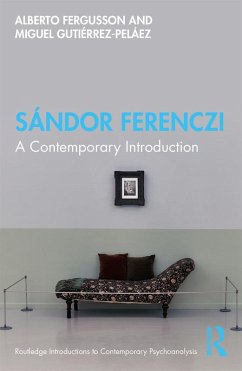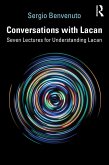23,95 €
23,95 €
inkl. MwSt.
Sofort per Download lieferbar

12 °P sammeln
23,95 €
Als Download kaufen

23,95 €
inkl. MwSt.
Sofort per Download lieferbar

12 °P sammeln
Jetzt verschenken
Alle Infos zum eBook verschenken
23,95 €
inkl. MwSt.
Sofort per Download lieferbar
Alle Infos zum eBook verschenken

12 °P sammeln
- Format: ePub
- Merkliste
- Auf die Merkliste
- Bewerten Bewerten
- Teilen
- Produkt teilen
- Produkterinnerung
- Produkterinnerung

Bitte loggen Sie sich zunächst in Ihr Kundenkonto ein oder registrieren Sie sich bei
bücher.de, um das eBook-Abo tolino select nutzen zu können.
Hier können Sie sich einloggen
Hier können Sie sich einloggen
Sie sind bereits eingeloggt. Klicken Sie auf 2. tolino select Abo, um fortzufahren.

Bitte loggen Sie sich zunächst in Ihr Kundenkonto ein oder registrieren Sie sich bei bücher.de, um das eBook-Abo tolino select nutzen zu können.
This book aims to present an up-to-date introduction and critical study of one of the most important psychoanalysts of all times, Sándor Ferenczi.
- Geräte: eReader
- mit Kopierschutz
- eBook Hilfe
Andere Kunden interessierten sich auch für
![Sándor Ferenczi (eBook, PDF) Sándor Ferenczi (eBook, PDF)]() Alberto FergussonSándor Ferenczi (eBook, PDF)23,95 €
Alberto FergussonSándor Ferenczi (eBook, PDF)23,95 €![The Emergence of Analytic Oneness (eBook, ePUB) The Emergence of Analytic Oneness (eBook, ePUB)]() Ofra EshelThe Emergence of Analytic Oneness (eBook, ePUB)37,95 €
Ofra EshelThe Emergence of Analytic Oneness (eBook, ePUB)37,95 €![The Psychoanalyst's Superegos, Ego Ideals and Blind Spots (eBook, ePUB) The Psychoanalyst's Superegos, Ego Ideals and Blind Spots (eBook, ePUB)]() Vic SedlakThe Psychoanalyst's Superegos, Ego Ideals and Blind Spots (eBook, ePUB)34,95 €
Vic SedlakThe Psychoanalyst's Superegos, Ego Ideals and Blind Spots (eBook, ePUB)34,95 €![Conversations with Lacan (eBook, ePUB) Conversations with Lacan (eBook, ePUB)]() Sergio BenvenutoConversations with Lacan (eBook, ePUB)39,95 €
Sergio BenvenutoConversations with Lacan (eBook, ePUB)39,95 €![White Privilege (eBook, ePUB) White Privilege (eBook, ePUB)]() Neil AltmanWhite Privilege (eBook, ePUB)18,95 €
Neil AltmanWhite Privilege (eBook, ePUB)18,95 €![A Psychotherapist Paints (eBook, ePUB) A Psychotherapist Paints (eBook, ePUB)]() Morris NitsunA Psychotherapist Paints (eBook, ePUB)32,95 €
Morris NitsunA Psychotherapist Paints (eBook, ePUB)32,95 €![Ferenczi on Freud's Couch (eBook, ePUB) Ferenczi on Freud's Couch (eBook, ePUB)]() Yves LugrinFerenczi on Freud's Couch (eBook, ePUB)33,95 €
Yves LugrinFerenczi on Freud's Couch (eBook, ePUB)33,95 €-
-
-
This book aims to present an up-to-date introduction and critical study of one of the most important psychoanalysts of all times, Sándor Ferenczi.
Dieser Download kann aus rechtlichen Gründen nur mit Rechnungsadresse in A, B, BG, CY, CZ, D, DK, EW, E, FIN, F, GR, HR, H, IRL, I, LT, L, LR, M, NL, PL, P, R, S, SLO, SK ausgeliefert werden.
Produktdetails
- Produktdetails
- Verlag: Taylor & Francis eBooks
- Seitenzahl: 138
- Erscheinungstermin: 10. Februar 2022
- Englisch
- ISBN-13: 9781000536133
- Artikelnr.: 63273280
- Verlag: Taylor & Francis eBooks
- Seitenzahl: 138
- Erscheinungstermin: 10. Februar 2022
- Englisch
- ISBN-13: 9781000536133
- Artikelnr.: 63273280
- Herstellerkennzeichnung Die Herstellerinformationen sind derzeit nicht verfügbar.
Alberto Fergusson, M.D., is a psychiatrist and psychoanalyst working in Colombia and in the United States. Since 1982, he has been the head and founder of the Institute of Accompanied Self-Rehabilitation. He was also the Founder of FUNGRATA in Colombia and FAS in Washington DC. He is currently Director and Full Professor at the Center for Psychosocial Studies (CEPPS) of the Universidad del Rosario, Colombia. He has been actively involved in the peace process in Colombia, at present as advisor to the president of the Truth Commission.
Miguel Gutiérrez-Peláez, Ph.D., is a Full Professor at the Center for Psychosocial Studies (CEPSS) of the Universidad del Rosario, Colombia and has been part of the Psychology Program since 2011. He is a member of the World Association of Psychoanalysis (AMP) and the New Lacanian School (NEL) and has his clinical practice in Colombia. He is author of the book Confusion of Tongues. A Return to Sándor Ferenczi (Routledge, 2018).
Miguel Gutiérrez-Peláez, Ph.D., is a Full Professor at the Center for Psychosocial Studies (CEPSS) of the Universidad del Rosario, Colombia and has been part of the Psychology Program since 2011. He is a member of the World Association of Psychoanalysis (AMP) and the New Lacanian School (NEL) and has his clinical practice in Colombia. He is author of the book Confusion of Tongues. A Return to Sándor Ferenczi (Routledge, 2018).
Introduction
1. The democratization of psychoanalysis. Sándor Ferenczi, from forced disappearance to resurrection
2. Sándor Ferenczi's biographical outline
3. Ferenczi's encounter with psychoanalysis
4. Ferenczi as a translator and divulgater of Freud's work
5. The concept of "Introjection"
6. Ferenczi's introduction of technical innovations
7. Thalassa and Bioanalysis
8. The end of analysis
9. Ferenczi's interest in the psychology of the child: upbringing and education
10. Ferenczi's latest writings. The effect of "confusion of tongues" and his Clinical Diary
11. Ferenczi's trauma theory
12. Splitting as a psychic defence
13. The repression of Ferenczi's work and the return of the repressed
14. Ferenczi's legacy and place in the world today
15. What is the relevance of Ferenczi in the future?
Epilogue
References
1. The democratization of psychoanalysis. Sándor Ferenczi, from forced disappearance to resurrection
2. Sándor Ferenczi's biographical outline
3. Ferenczi's encounter with psychoanalysis
4. Ferenczi as a translator and divulgater of Freud's work
5. The concept of "Introjection"
6. Ferenczi's introduction of technical innovations
7. Thalassa and Bioanalysis
8. The end of analysis
9. Ferenczi's interest in the psychology of the child: upbringing and education
10. Ferenczi's latest writings. The effect of "confusion of tongues" and his Clinical Diary
11. Ferenczi's trauma theory
12. Splitting as a psychic defence
13. The repression of Ferenczi's work and the return of the repressed
14. Ferenczi's legacy and place in the world today
15. What is the relevance of Ferenczi in the future?
Epilogue
References
Introduction; 1. The democratization of psychoanalysis. Sándor Ferenczi, from forced disappearance to resurrection; 2. Sándor Ferenczi's biographical outline; 3. Ferenczi's encounter with psychoanalysis; 4. Ferenczi as a translator and divulgater of Freud's work; 5. The concept of "Introjection"; 6. Ferenczi's introduction of technical innovations; 7. Thalassa and Bioanalysis; 8. The end of analysis; 9. Ferenczi's interest in the psychology of the child: upbringing and education; 10. Ferenczi's latest writings. The effect of "confusion of tongues" and his Clinical Diary; 11. Ferenczi's trauma theory; 12. Splitting as a psychic defence; 13. The repression of Ferenczi's work and the return of the repressed; 14. Ferenczi's legacy and place in the world today; 15. What is the relevance of Ferenczi in the future?; Epilogue; References
Introduction
1. The democratization of psychoanalysis. Sándor Ferenczi, from forced disappearance to resurrection
2. Sándor Ferenczi's biographical outline
3. Ferenczi's encounter with psychoanalysis
4. Ferenczi as a translator and divulgater of Freud's work
5. The concept of "Introjection"
6. Ferenczi's introduction of technical innovations
7. Thalassa and Bioanalysis
8. The end of analysis
9. Ferenczi's interest in the psychology of the child: upbringing and education
10. Ferenczi's latest writings. The effect of "confusion of tongues" and his Clinical Diary
11. Ferenczi's trauma theory
12. Splitting as a psychic defence
13. The repression of Ferenczi's work and the return of the repressed
14. Ferenczi's legacy and place in the world today
15. What is the relevance of Ferenczi in the future?
Epilogue
References
1. The democratization of psychoanalysis. Sándor Ferenczi, from forced disappearance to resurrection
2. Sándor Ferenczi's biographical outline
3. Ferenczi's encounter with psychoanalysis
4. Ferenczi as a translator and divulgater of Freud's work
5. The concept of "Introjection"
6. Ferenczi's introduction of technical innovations
7. Thalassa and Bioanalysis
8. The end of analysis
9. Ferenczi's interest in the psychology of the child: upbringing and education
10. Ferenczi's latest writings. The effect of "confusion of tongues" and his Clinical Diary
11. Ferenczi's trauma theory
12. Splitting as a psychic defence
13. The repression of Ferenczi's work and the return of the repressed
14. Ferenczi's legacy and place in the world today
15. What is the relevance of Ferenczi in the future?
Epilogue
References
Introduction; 1. The democratization of psychoanalysis. Sándor Ferenczi, from forced disappearance to resurrection; 2. Sándor Ferenczi's biographical outline; 3. Ferenczi's encounter with psychoanalysis; 4. Ferenczi as a translator and divulgater of Freud's work; 5. The concept of "Introjection"; 6. Ferenczi's introduction of technical innovations; 7. Thalassa and Bioanalysis; 8. The end of analysis; 9. Ferenczi's interest in the psychology of the child: upbringing and education; 10. Ferenczi's latest writings. The effect of "confusion of tongues" and his Clinical Diary; 11. Ferenczi's trauma theory; 12. Splitting as a psychic defence; 13. The repression of Ferenczi's work and the return of the repressed; 14. Ferenczi's legacy and place in the world today; 15. What is the relevance of Ferenczi in the future?; Epilogue; References







